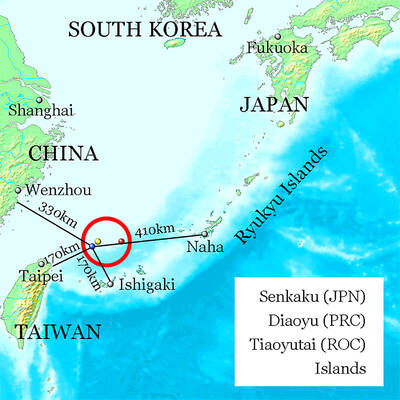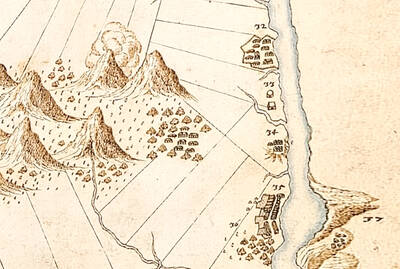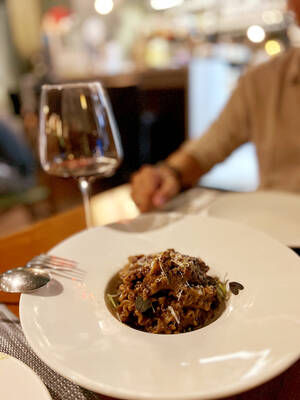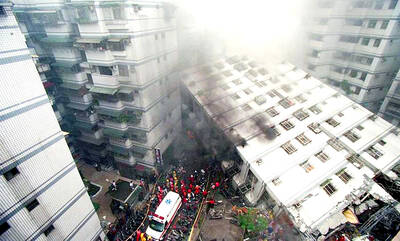The 7th Taishin Arts Award (第七屆台新藝術獎) ceremony was held on Saturday afternoon at Taishin Bank’s swanky building on Renai circle in a spartan ceremony befitting Taiwan’s troubled economy.
Capital Ballet Taipei’s (台北首督芭蕾舞團) Surround (井) won the top award in the performance arts category and Wang Jun-jieh’s (王俊傑) Project David III: David’s Paradise (大衛計畫第三部:大衛天堂) took the first prize in visual arts.
Each award comes with a purse of NT$1 million.
The Taishin Arts Award is an annual competition that recognizes artistic excellence in two categories: visual and performance art. There is also a special jury prize. The jury, consisting of journalists, academics and art professionals from Taiwan and abroad, selected the nominees from performances and exhibitions that premiered in Taiwan last year.
Commonplace objects such as tables and boxes were employed in Surround as a means of investigating spatial and temporal relationships. The judges cited its accessibility to audiences and the emotional intensity of the show’s dancers as reasons why it took top honors.
Wang’s five-screen video installation Project David III: David’s Paradise was created in memory of Wang’s deceased friend and contemplates the vicissitudes of life. Art critic and jury member Chen Tai-song (陳泰松) said that the work, with its slow-moving frames that merge into a seamless whole, “leaves a lasting impression” on viewers and is “a classic that later artists will emulate.”
The jury award, which included a NT$300,000 prize, went to Wu Tien-chang (吳天章) for his staged photography series Shock. Shot (懾˙相).
The remaining short-listed artists included Chou Yu-cheng (周育正) for his work Superb Superficialness (很膚淺), Pan Ta-chien (潘大謙) for Flashover (閃燃 — 潘大謙個展) and Taiwan Field Factory (台灣田野工場) for Art Installation in Tree Valley Park’s Public Space (樹谷園區公共空間藝術設置).
Shakespeare’s Wild Sisters Group (莎士比亞的妹妹們的劇團) was nominated twice in the performance art category for Sylvia Plath (給普拉斯) and Listen to Me, Please (請聽我說—豪華加長版).
Other finalists include the Death and Love of My Mother — The Reminiscence of the Diva Daughter (凍水牡丹 — 廖瓊枝與臺灣國家國樂團) by National Chinese Orchestra (臺灣國家國樂團), Ju Percussion Group’s (朱宗慶打擊樂團) Percussion Happens Daily (擊樂進行式), The Sky Crisis (飛天行動─ 島國預言瘋狂喜劇) by the Party Group (同黨劇團), M.O.V.E. Theatre’s (動見体劇團) Fable to Be, or Not to Be (漢字寓言:未來系青年觀點報告), The Village (寶島一村) by Performance Workshop (表演工作坊), Reflex (Double C舞團—反射) by Wu Chun-hsien (吳俊憲) and Chou Shu-yi’s (周書毅) Visible City, People Filled with Air (看得見的城市—人充滿空氣).
MOCA, Taipei is currently holding an excellent exhibition on this year’s featuring contributions from each nominee.
The 7th Taishin Arts Award Exhibition runs until May 24 at the Museum of Contemporary Art, Taipei (MOCA, Taipei), 39 Changan W Rd, Taipei City (台北市長安西路39號). Call (02) 2552-3721 for more information. The museum opens from 10am to 6pm, Tuesday through Sunday, and is closed on Mondays. On the Net: www.mocataipei.org.tw.

Last week gave us the droll little comedy of People’s Republic of China’s (PRC) consul general in Osaka posting a threat on X in response to Japanese Prime Minister Sanae Takaichi saying to the Diet that a Chinese attack on Taiwan may be an “existential threat” to Japan. That would allow Japanese Self Defence Forces to respond militarily. The PRC representative then said that if a “filthy neck sticks itself in uninvited, we will cut it off without a moment’s hesitation. Are you prepared for that?” This was widely, and probably deliberately, construed as a threat to behead Takaichi, though it

Nov. 17 to Nov. 23 When Kanori Ino surveyed Taipei’s Indigenous settlements in 1896, he found a culture that was fading. Although there was still a “clear line of distinction” between the Ketagalan people and the neighboring Han settlers that had been arriving over the previous 200 years, the former had largely adopted the customs and language of the latter. “Fortunately, some elders still remember their past customs and language. But if we do not hurry and record them now, future researchers will have nothing left but to weep amid the ruins of Indigenous settlements,” he wrote in the Journal of

Even after years in business, weekend tables here can be booked out a month in advance. The price point far exceeds its competitors. Granted, expectations are soaringly high, but something here failed to hit the high notes. There are a few telltale signs that a restaurant relies solely on outstanding food to create the experience, no gimmicks or distractions needed. La Mole is such a restaurant. The atmosphere is food-forward, with an open kitchen center stage. Our tables are simple; no candles, no dim lighting, no ambient music. The menu is brief, and our waiter directs most

If China attacks, will Taiwanese be willing to fight? Analysts of certain types obsess over questions like this, especially military analysts and those with an ax to grind as to whether Taiwan is worth defending, or should be cut loose to appease Beijing. Fellow columnist Michael Turton in “Notes from Central Taiwan: Willing to fight for the homeland” (Nov. 6, page 12) provides a superb analysis of this topic, how it is used and manipulated to political ends and what the underlying data shows. The problem is that most analysis is centered around polling data, which as Turton observes, “many of these